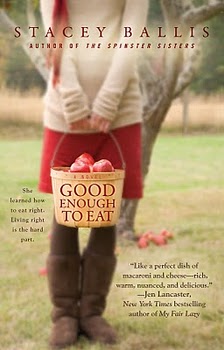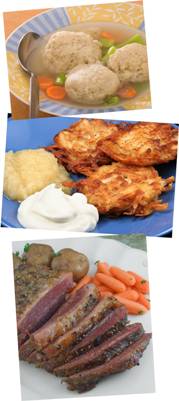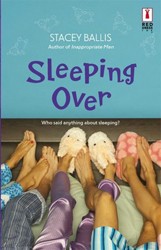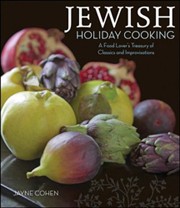Stacey Ballis‘ newest book, Good Enough to Eat, will be available September 7th. Check back all week for more delicious posts from Stacey for the Jewish Book Council and MyJewishLearning‘s Visiting Scribe.
 When people ask me what I love most about being Jewish, the images flash before my eyes.
When people ask me what I love most about being Jewish, the images flash before my eyes.
Succulent slices of slow cooked brisket, moist with rich tomato‑y gravy. Latkes, crisp on the outside, melting in the middle, with applesauce and sour cream. Light as air matzo balls, floating in a pool of golden chicken soup, dense sweet noodle kugel.
I mean, yes, of course I love being a part of a religion that allows so many different ways to worship, that holds such a long tradition of philanthropy and artistry, that has such interesting traditions and rituals. Even though I have never been particularly observant, I chose Brandeis as an undergraduate in large part because the school represented the best of educational excellence and social activism. Getting all the Jewish holidays off didn’t hurt my feelings, either. But while my matriculation there did wonders for my Yiddish vocabulary, it didn’t make me any less secular. For me, someone whose upbringing always felt a little bit Jew-ish, as opposed to really Jewish, food is where I have always felt most connected to my people and my history.
Don’t get me wrong, we aren’t non-practicing, we just found our own style. We may not have belonged to a temple, but my sister and I were both bat mitzvahed, we just did it with a private tutor instead of Hebrew school and with a borrowed torah at our weekend place instead of on a traditional bimah. And for mine, a Chinese buffet luncheon to follow.
We share the major holidays with friends and family, choosing readings from books in the living room over synagogue services. Our Passover seders may be brief, but they have deep meaning and we take them seriously, adding our own traditions over the years. But always, the celebration centers on food.
In my writing, my heroines have always been Jewish, at varying levels of observancy, but always connected to the culinary history of our people. In my new book, Good Enough to Eat, Melanie Hoffman is a chef specializing in healthy gourmet food, and during the course of the book we see her make a pilgrimage to the Holocaust Museum, speak at a JUF luncheon, and make brisket for her boyfriend’s family seder. Even though the character is only half-Jewish, and non-observant in the religious sense, she is connected to her heritage through her cooking. Because for me, and by proxy, my characters, food, both the specifics of traditional recipes, and the generic feeling of gathering friends and family around the table, is always something of a Jewish experience at its core. Breaking of bread, or matzo where appropriate, sharing of stories, the sense of unity created around a dinner table, this is where I feel the most direct link to our shared past. I have always believed that when a people have been forced to work hard at maintaining community, bringing people together for meals becomes an essential part of how you keep faith.
 Rosh Hashanah has always been one of my favorite holidays. Chicago weather tends to be lovely, the first inkling of fall in the air, crisp and cool but not yet cold. We usually spend it with our best family friends, once we were two couples and five kids, now there are seven couples and seven grandkids with another on the way! We have spent the day walking the Botanical Gardens or at a local state park. We have gone to the zoo, or been out in the country. We have gone apple picking for the apples we later dip in local honey as part of the holiday meal. I associate the holiday with love and laughter and the great outdoors, and an amazing dinner!
Rosh Hashanah has always been one of my favorite holidays. Chicago weather tends to be lovely, the first inkling of fall in the air, crisp and cool but not yet cold. We usually spend it with our best family friends, once we were two couples and five kids, now there are seven couples and seven grandkids with another on the way! We have spent the day walking the Botanical Gardens or at a local state park. We have gone to the zoo, or been out in the country. We have gone apple picking for the apples we later dip in local honey as part of the holiday meal. I associate the holiday with love and laughter and the great outdoors, and an amazing dinner!
As you look to the Jewish New Year, I hope you take a moment to be grateful for your blessings, and remember to bring sweetness into the coming year.
Good Enough to Eat is now available.
A Sweet New Year
Why Do They Call it Fasting When it Goes SO SLOW?
The Good, The Bad and the Delicious



